
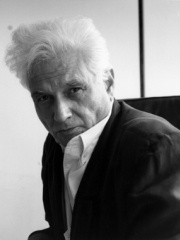
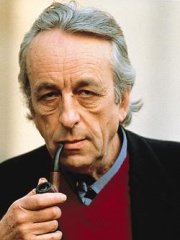
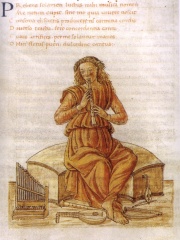

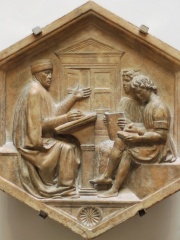
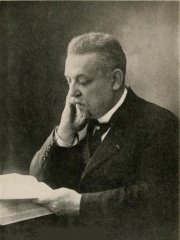

The Most Famous
PHILOSOPHERS from Algeria
This page contains a list of the greatest Algerian Philosophers. The pantheon dataset contains 1,267 Philosophers, 9 of which were born in Algeria. This makes Algeria the birth place of the 23rd most number of Philosophers behind Hungary, and Japan.
Top 9
The following people are considered by Pantheon to be the most legendary Algerian Philosophers of all time. This list of famous Algerian Philosophers is sorted by HPI (Historical Popularity Index), a metric that aggregates information on a biography's online popularity.

1. Augustine of Hippo (354 - 430)
With an HPI of 90.39, Augustine of Hippo is the most famous Algerian Philosopher. His biography has been translated into 157 different languages on wikipedia.
Augustine of Hippo ( aw-GUST-in, US also AW-gə-steen; Latin: Aurelius Augustinus Hipponensis; 13 November 354 – 28 August 430) was a theologian and philosopher, the bishop of Hippo Regius from Thagaste in Numidia Cirtensis, (present-day Souk Ahras, Algeria). His writings deeply influenced the development of Western philosophy and Western Christianity, and he is viewed as one of the most important Church Fathers of the Latin Church in the Patristic Period. His many important works include The City of God, On Christian Doctrine, and Confessions. According to his contemporary, Jerome of Stridon, Augustine "established anew the ancient Faith". In his youth he was drawn to the Manichaean faith, and later to the Hellenistic philosophy of Neoplatonism. After his conversion to Christianity and baptism in 386, Augustine developed his own approach to philosophy and theology, accommodating a variety of methods and perspectives. Believing the grace of Christ was indispensable to human freedom, he helped formulate the doctrine of original sin and made significant contributions to the development of just war theory. When the Western Roman Empire began to disintegrate, Augustine imagined the Church as a spiritual City of God, distinct from the material Earthly City. The segment of the Church that adhered to the concept of the Trinity as defined by the Council of Nicaea and the Council of Constantinople closely identified with Augustine's On the Trinity. Augustine is recognized as a saint in the Catholic Church, the Eastern Orthodox Church, the Lutheran churches, and the Anglican Communion. He is also a preeminent Catholic Doctor of the Church and the patron of the Augustinians. His memorial is celebrated on 28 August, the day of his death. Augustine is the patron saint of brewers, printers, theologians, and a number of cities and dioceses. His thoughts profoundly influenced the medieval worldview. Many Protestants, especially Calvinists and Lutherans, consider him one of the theological fathers of the Protestant Reformation due to his teachings on salvation and divine grace. Protestant Reformers generally, and Martin Luther in particular, held Augustine in preeminence among early Church Fathers. From 1505 to 1521, Luther was a member of the Order of the Augustinian Eremites. In the East, his teachings are more disputed. The most controversial doctrine associated with him, the filioque, was rejected by the Eastern Orthodox Church. Other disputed teachings include his views on original sin, the doctrine of grace, and predestination. Though considered to be mistaken on some points, he is still considered a saint and has influenced some Eastern Church Fathers, most notably Gregory Palamas. In the Greek and Russian Orthodox Churches, his feast day is celebrated on 15 June. Among modern Eastern Orthodox theologians, his views were notably attacked by John Romanides, but others have shown significant approbation, chiefly Georges Florovsky.

2. Jacques Derrida (1930 - 2004)
With an HPI of 78.95, Jacques Derrida is the 2nd most famous Algerian Philosopher. His biography has been translated into 83 different languages.
Jacques Derrida (; French: [ʒak dɛʁida]; born Jackie Élie Derrida; 15 July 1930 – 9 October 2004) was a French philosopher. He developed the philosophy of deconstruction, which he utilized in a number of his texts, and which was developed through close readings of the linguistics of Ferdinand de Saussure and Husserlian and Heideggerian phenomenology. He is one of the major figures associated with post-structuralism and postmodern philosophy although he distanced himself from post-structuralism and disavowed the word "postmodernity". During his career, Derrida published over 40 books, together with hundreds of essays and public presentations. He has had a significant influence on the humanities and social sciences, including philosophy, literature, law, anthropology, historiography, applied linguistics, sociolinguistics, psychoanalysis, music, architecture, and political theory. Into the 2000s, his work retained major academic influence throughout the United States, continental Europe, South America and all other countries where continental philosophy has been predominant, particularly in debates around ontology, epistemology (especially concerning social sciences), ethics, aesthetics, hermeneutics, and the philosophy of language. For the last two decades of his life, Derrida was Professor in Humanities at the University of California, Irvine. In most of the Anglosphere, where analytic philosophy is dominant, Derrida's influence is most presently felt in literary studies due to his longstanding interest in language and his association with prominent literary critics. He also influenced architecture (in the form of deconstructivism), music (especially in the musical atmosphere of hauntology), art, and art criticism. Particularly in his later writings, Derrida addressed ethical and political themes in his work. Some critics consider Speech and Phenomena (1967) to be his most important work, while others cite Of Grammatology (1967), Writing and Difference (1967), and Margins of Philosophy (1972). These writings influenced various activists and political movements. He became a well-known and influential public figure, while his approach to philosophy and the notorious abstruseness of his work made him controversial.

3. Louis Althusser (1918 - 1990)
With an HPI of 75.82, Louis Althusser is the 3rd most famous Algerian Philosopher. His biography has been translated into 63 different languages.
Louis Pierre Althusser (UK: , US: ; French: [altysɛʁ]; 16 October 1918 – 22 October 1990) was a French Marxist philosopher who studied at the École Normale Supérieure in Paris, where he eventually became Professor of Philosophy. Althusser was a long-time member and sometimes a strong critic of the French Communist Party. His arguments and theses were set against the threats that he saw attacking the theoretical foundations of Marxism. These included both the influence of empiricism on Marxist theory, and humanist and reformist orientations which manifested as divisions in the European communist parties, as well as the problem of the cult of personality and of ideology. Althusser is commonly referred to as a structural Marxist, although his relationship to other schools of French structuralism is not a simple affiliation and he was critical of many aspects of structuralism. He later described himself as a social anarchist. Althusser's life was marked by periods of intense mental illness. In 1980, he killed his wife, the sociologist Hélène Rytmann, by strangling her. He was declared unfit to stand trial due to insanity and committed to a psychiatric hospital for three years. He did little further academic work, dying in 1990.

4. Martianus Capella (360 - 428)
With an HPI of 69.90, Martianus Capella is the 4th most famous Algerian Philosopher. His biography has been translated into 34 different languages.
Martianus Minneus Felix Capella (fl. c. 410–420) was a jurist, polymath and Latin prose writer of late antiquity, one of the earliest developers of the system of the seven liberal arts that structured early medieval education. He was a native of Madaura. His single encyclopedic work, De nuptiis Philologiae et Mercurii ("On the Marriage of Philology and Mercury"), also called De septem disciplinis ("On the seven disciplines"), is an elaborate didactic allegory written in a mixture of prose and elaborately allusive verse. Martianus often presents philosophical views based on Neoplatonism, the Platonic school of philosophy pioneered by Plotinus and his followers. Like his near-contemporary Macrobius, who also produced a major work on classical Roman religion, Martianus never directly identifies his own religious affiliation. Much of his work occurs in the form of dialogue, and the views of the interlocutors may not represent the author's own.
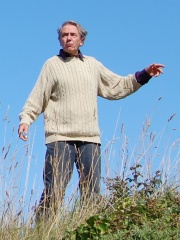
5. Jacques Rancière (b. 1940)
With an HPI of 68.85, Jacques Rancière is the 5th most famous Algerian Philosopher. His biography has been translated into 30 different languages.
Jacques Rancière (; French: [ʒak ʁɑ̃sjɛʁ]; born 10 June 1940) is a French philosopher, Professor of Philosophy at European Graduate School in Saas-Fee and Emeritus Professor of Philosophy at the University of Paris VIII: Vincennes—Saint-Denis. After co-authoring Reading Capital (1965) with the structuralist Marxist philosopher Louis Althusser and others, and after witnessing the 1968 political uprisings his work turned against Althusserian Marxism, he later came to develop an original body of work focused on aesthetics.

6. Marcus Cornelius Fronto (100 - 160)
With an HPI of 68.00, Marcus Cornelius Fronto is the 6th most famous Algerian Philosopher. His biography has been translated into 33 different languages.
Marcus Cornelius Fronto (c. 100 – late 160s AD), best known as Fronto, was a Roman grammarian, rhetorician, and advocate. Of Berber origin, he was born at Cirta (modern-day Constantine, Algeria) in Numidia. He was suffect consul for the nundinium of July–August 142 with Gaius Laberius Priscus as his colleague. Emperor Antoninus Pius appointed him tutor to his adopted sons, the future emperors Marcus Aurelius and Lucius Verus.

7. Priscian (500 - 600)
With an HPI of 66.63, Priscian is the 7th most famous Algerian Philosopher. His biography has been translated into 30 different languages.
Priscianus Caesariensis (fl. AD 500), commonly known as Priscian ( or ), was a Latin grammarian and the author of the Institutes of Grammar, which was the standard textbook for the study of Latin during the Middle Ages. It also provided the raw material for the field of speculative grammar.

8. Émile Boirac (1851 - 1917)
With an HPI of 61.06, Émile Boirac is the 8th most famous Algerian Philosopher. His biography has been translated into 18 different languages.
Émile Boirac (26 August 1851 – 20 September 1917) was a French philosopher, parapsychologist, promoter of Esperanto and writer.

9. Catherine Malabou (b. 1959)
With an HPI of 52.64, Catherine Malabou is the 9th most famous Algerian Philosopher. Her biography has been translated into 15 different languages.
Catherine Malabou (French: [malabu]; born 18 June 1959) is a French philosopher. She is a professor at the Centre for Research in Modern European Philosophy (CRMEP) at Kingston University, at the European Graduate School, and in the department of Comparative Literature at the University of California, Irvine, a position formerly held by Jacques Derrida.
People
Pantheon has 9 people classified as Algerian philosophers born between 100 and 1959. Of these 9, 2 (22.22%) of them are still alive today. The most famous living Algerian philosophers include Jacques Rancière, and Catherine Malabou. The most famous deceased Algerian philosophers include Augustine of Hippo, Jacques Derrida, and Louis Althusser.
Living Algerian Philosophers
Go to all RankingsDeceased Algerian Philosophers
Go to all RankingsAugustine of Hippo
354 - 430
HPI: 90.39
Jacques Derrida
1930 - 2004
HPI: 78.95
Louis Althusser
1918 - 1990
HPI: 75.82
Martianus Capella
360 - 428
HPI: 69.90
Marcus Cornelius Fronto
100 - 160
HPI: 68.00
Priscian
500 - 600
HPI: 66.63
Émile Boirac
1851 - 1917
HPI: 61.06
Overlapping Lives
Which Philosophers were alive at the same time? This visualization shows the lifespans of the 3 most globally memorable Philosophers since 1700.

